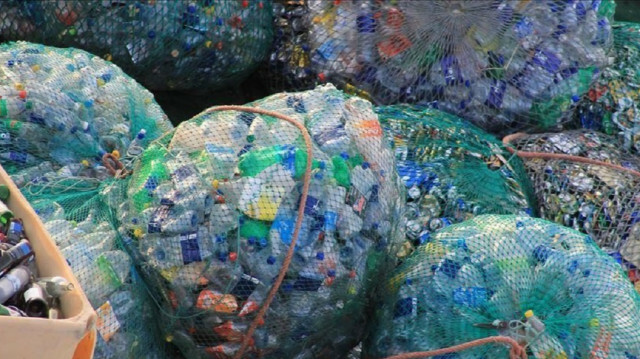
Rwanda is looking at a public-private partnership as a new approach to completely eliminate single-use plastics in the country, officials say.
In 2019, the East African country enacted a law banning single-use plastics and had given a three-year grace period to businesses to phase out their stocks and shift to new business models of producing single-use plastics for export or venture into producing alternative products to replace plastic ones.
The law has a list of single-use plastics that are currently prohibited in Rwanda to protect the environment.
These include plastic water bottles, soda bottles, drinking straws, food packaging materials, and plastic bags.
It also recommends a plastic collection program in which businesses in the plastics sector will have to establish ways of collecting plastic waste as a way of reducing public litter.
The legislation stipulates a penalty of 50,000 Rwandan francs (some $50) for individuals dumping plastics in public spaces and 5 million Rwandan francs ($4,965) for companies not adapting to proper waste management.
- Why partnership?
The public-private partnership is expected to address funding needs to shift businesses and collect plastics from major companies such as beverage industries, according to the Rwanda Environment Management Authority (REMA).
“The partnership will comprehensively address issues related to single-use plastics, including collection, recycling and disposal,” said Juliet Kabera, the director general of REMA.
Kabera stressed the need for cooperation in the fight against plastics and single-use plastics.
The partnership between Rwanda Environment Management Authority and the Private Sector Federation, unveiled as part of activities to mark this year’s World Environment Day, will be implemented under a five-year project for sustainable management of single-use plastics.
Under the partnership, some $706,000 will be collected from the private sector to tackle the harmful plastics.
Kabera said the collaboration is to provide a lasting solution, whereby the private sector will support financial mobilization -- ensuring collection, disposal and recycling of single-use plastics, while REMA will provide necessary technical support and raise awareness on waste management.
REMA underlines that a proper waste management plan will counter climate change issues and ensure clean air by reducing carbon emissions.
Rwanda has promised to cut emissions by at least 16% by 2030.
According to Faustin Munyazikwiye, deputy director general of REMA, the law is clear and several alternatives are recommended such as glasses to replace plastic drinking water bottles, and bamboo straws to replace plastic ones.
However, a new bill has been proposed, which prohibits the import of new stocks of the banned plastic materials.
Once it is passed by parliament, the legislation will impose a charge on imported plastic-packed goods, a levy which was designed to cater for the collection and management of imported plastic packaging.
- Single-use plastics still on market
A recent field assessment by REMA ahead of the September 2021 deadline for the phase-out of harmful plastics showed that many traders were aware of the deadline and had started shifting from purchasing single-use plastics.
However, some traders were found with stocks of single-use plastics on their shelves which their clients continued to buy.
For example, at supermarkets and butcheries in the Kigali city suburbs of Kimironko and Remera, inspectors found imported plastic cups and straws among others on sale.
“We were told that some of these plastics are not harmful. That is why we still import them. We need the law to be clear because our bosses continue to import these goods for sale,” said Theogene Niyigena, a supermarket manager.
- Local firms find solution
Meanwhile, major manufacturers and importers of single-use plastics entered a deal with Coped Rwanda, a local waste management and recycling firm, to start managing single-use plastics, collecting and recycling them into construction materials.
Paulin Buregeya, Coped Rwanda’s chief executive officer, said the deal is being implemented in two phases. This first phase involves collecting plastic bottles from centers across Kigali and turning them into construction materials, and the second phase covers recycling.
Waste collection costs about $80,000 while turning collected plastic bottles into construction materials is still under feasibility, but it costs roughly $2 million, according to Buregeya.
He said they started with big beverage companies which use large quantities of plastic bottles for packaging.
So far in phase one, collected samples of plastic waste are turned into construction materials – such as floor tiles, paves and roof tiles.
“In this phase, there is a plan to fully recycle plastic bottles into new bottles and sell on the market with standards met or make new export materials such as fiber and cloth threads for China and Indian markets,” Buregeya added.
He said that they have spent a full year with research on PET waste management (bottles made of polyethylene terephthalate) and discovered that it is only PET bottles which do not have recycling facilities, while others have alternative recycling options.
Indeed, the ban has triggered new packaging ideas, with about five new recycling businesses coming up to turn disposed plastics into other usable material.
For example, tooth picks which used to be packed in plastic covers are now being packed locally in small paper boxes by a local company.
Waste management companies have been tasked to look for various options for companies using PETs, Buregeya said.
Rwanda is the first of 34 African countries to impose a ban on single-use plastics on the continent.













